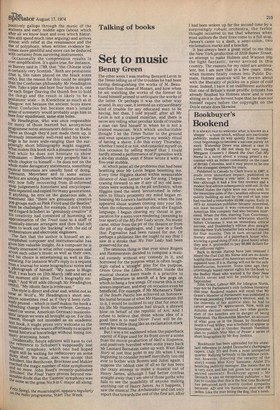Talking of books
Set to music
Benny Green
The other week I was reading Bernard Levin in the Times telling us of the troubles he had been having distinguishing the works of M. Beaumarchais from those of Mozart, and how when he sat watching the works of the former he found himself primed to anticipate the works of the latter. Or perhaps it was the other way around. In any case, it seemed an extraordinary kind of trouble for any educated man to be having, but then, I told myself, after all Mr Levin is not a trained musician, and there is never any telling what peculiar kinds of trouble a man can find himself in when he is not a trained musician. With which uncharitable thought I let the Times flutter to the ground and went upstairs to perform my weekly ritual of having a shave. I do this every Thursday, whether I need it or not, and consoled myself on this occasion by telling myself that I could hardly attend a performance of Pygmalion with a six-day stubble, even if Shaw wrote it with a five-year stubble.
At which point all the problems that had been besetting poor Mr Levin began besetting me. Every time Higgins skated within measurable distance of Alan Lerner's cue for song, I began craning forward to see if any of my old associates were working in the pit orchestra; when Higgins used the word 'accustomed' in reference to Eliza's proximity my mind began rehearsing Mr Loewe's harmonies; when the line appeared about women coming into your life, when the reference came up about the English language, I began clearing my throat in preparation for a sotto voce rendering (meaning to tear apart) of the My Fair Lady score. No music came, either from the pit of the theatre or from the pit of my diaphragm, and I saw in a flash that Pygmalion had been ruined for me. Or perhaps a philistine like me ought to say that I saw in a stroke that My Fair Lady had been preserved for me.
The ominous thing is that ever since Rogers and Hammerstein decided to compose a musi cal comedy without any comedy in it, and borrowed for the purpose what is often laugh
ingly called a 'straight' play for the purpose, Green Grow the Lilacs, librettists inside the musical theatre have, made it a practice to pillage literature in seareh of a few pegs on which to hang a few songs. Of course this is not always important, and may on occasion even be beneficial. For example, if Mr Michener's Tales of the South Pacific has achieved an honourable burial because of what Mr Hammerstein did to it, I would be inclined to say that for once in his life Mr Hammerstein had struck a shrewd blow on behalf of the republic of Art. And I refuse to believe that those whose idea of a good time is to read Oliver Twist will be deterred by a little thing like an exclamation mark and a few musicians. But I was a bit saddened when the paperback reprint of Kipps used for its front cover a scene from the movie production of Haifa Sixpence, and positively horrified when some years back Mr Leonard Bernstein came up with West Side
Story at just that point in my life when I was beginning to consider myself mercifully too old ever to bother with Romeo and Juliet again. I suppose the oddest case of all so far has been the crazy attempt to make a musical out of Henry James, although I had better confess straight away that I am one of those goths who fails to see the possibility of anyone making anything out of Henry James. As it happens, I
saw the musical The Ambassador and can only report that towards the end of the first act, after
I had been woken up for the second time by a surprisingly robust orchestra, the feeble thought occurred to me that whereas when most authors die their lives come to a full stop, James's came to a dash, a semi-colon, two exclamation marks and a bracket.
It has always been a great relief to me that the New York production of 2218 Baker Street, an attempt to make Holmes and Watson trip the light fantastic, never arrived in this country. The reasons for my relief are ambivalent, but I am sure that in a few years time, when Holmes finally comes into Public Domain, Holmes musicals will be strewn about with the liberality of pickles on a plate of cold meat. Indeed, I have it on indifferent authority that one of Britain's most prolific lyricists has . already finished his Holmes show and is now sitting on it in the fervent hope that he does not himself expire before the copyright on the Doyle estate does likewise.


































 Previous page
Previous page